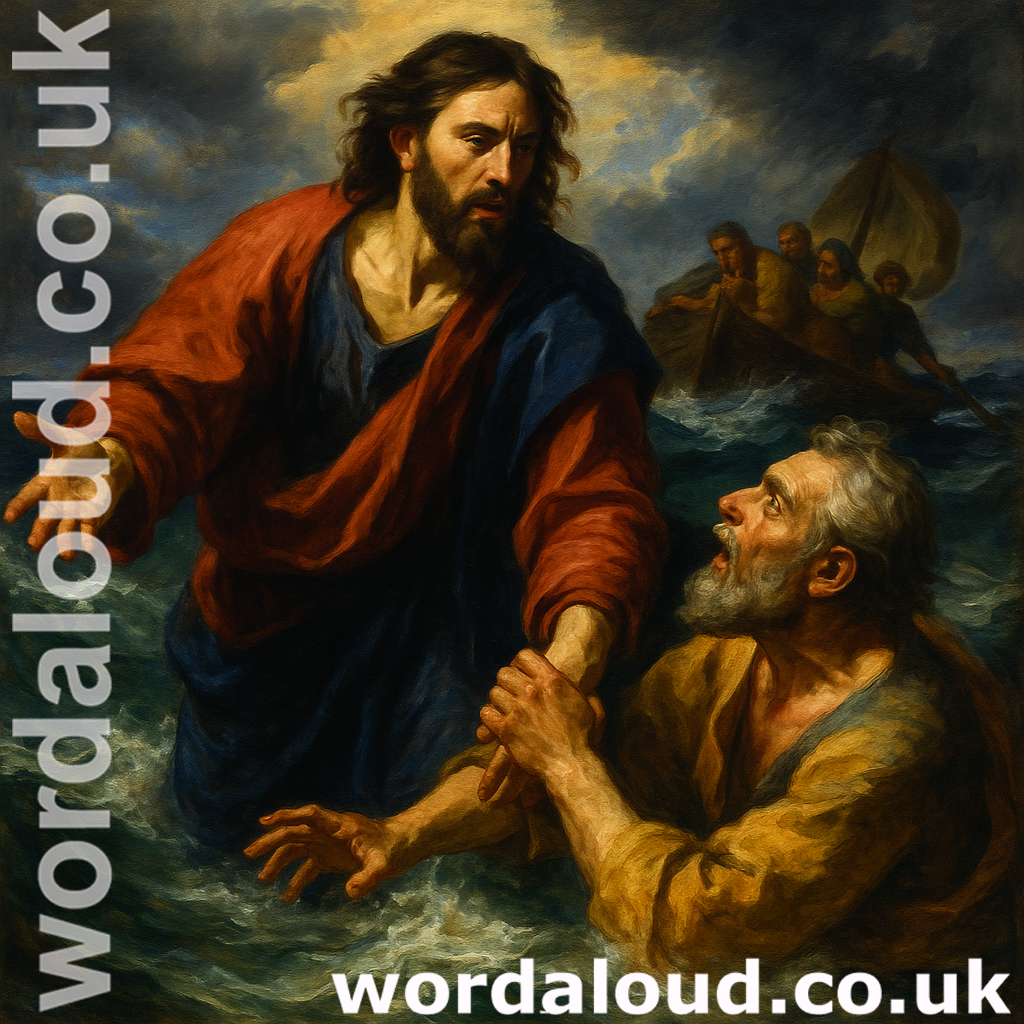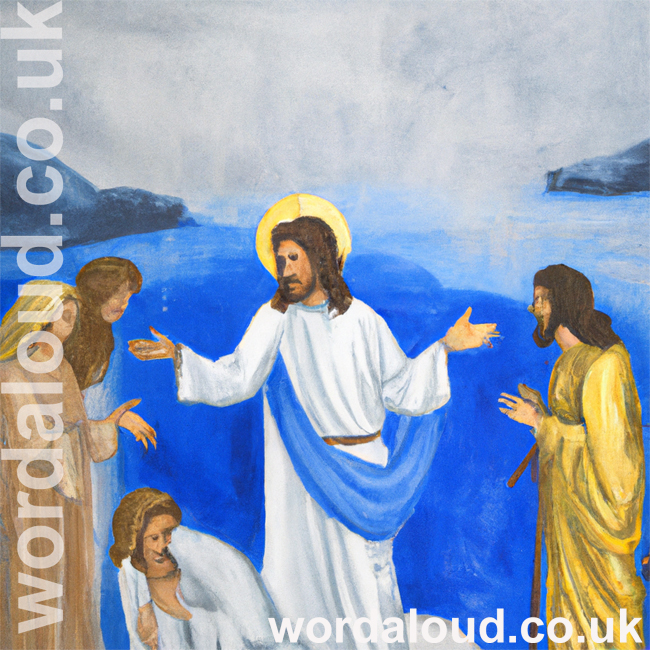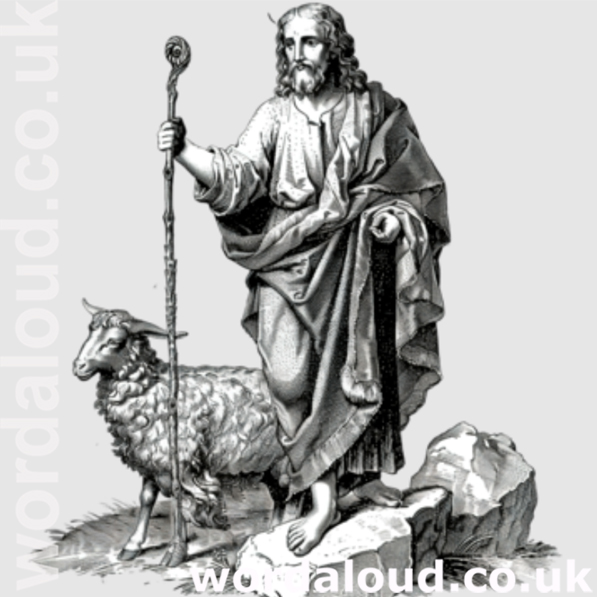Christian Art | Easter To Pentecost
John 6: 30-34 Audio Bible KJV | King James Audio Bible | King James Version | Daily Verses
30 They said therefore unto him, What sign shewest thou then, that we may see, and believe thee? what dost thou work?
31 Our fathers did eat manna in the desert; as it is written, He gave them bread from heaven to eat.
32 Then Jesus said unto them, Verily, verily, I say unto you, Moses gave you not that bread from heaven; but my Father giveth you the true bread from heaven.
33 For the bread of God is he which cometh down from heaven, and giveth life unto the world.
34 Then said they unto him, Lord, evermore give us this bread.
The people who have looked for and found Jesus now ask for a sign. Notwithstanding the miracle of the loaves and fishes, which they have witnessed, they now say they require a sign in order to believe in Jesus. It is in some ways akin to Christ’s temptation in the desert, when Satan tempted him to prove his divinity. We also recall Christ’s teaching: ‘It is a wicked and adulterous generation that seeketh after a sign.’ Despite all of this, Jesus is patient with the people, continuing to teach them and ask them to follow him.
It seems to the Jews as if Jesus is placing himself above Moses. It is as if they intuit that the New Law declared by Christ supercedes the Old Law of Moses. In doing so, they recall the miracle of the loaves and fishes. When Moses led the people through the wilderness, and when they were hungry, they were given manna to eat, which was bread of heaven. Jesus now clarifies the meaning of this passage of Jewish history. It was not Moses who gave the people bread; it was the Father. Now Jesus is come as the bread of heaven. Once more, we are called to share in the Lord’s supper.
St Augustine writes: ‘The Lord spoke of himself in a way which made him seem superior to Moses, for Moses never dared to say that he would give food which would never perish but which would endure to eternal life. Jesus promises much more than Moses. Moses promised a kingdom, and a land flowing with milk and honey, good health and other temporal blessings, plenty for the belly, but food which perishes; whereas Christ promised food which never perishes but which endures forever.’
The people listening to Jesus now hunger in faith. They have been given, by Jesus, the promise of the bread of life eternal. They now know that this great gift comes from God. They have heard that the manna in the desert was only a prefiguration of the true bread of life, which we receive through the Eucharist. The people acknowledge Jesus as Lord and they ask Jesus that they may be given this bread always.
‘If you search for the reason why a man loves God you will find no other reason at all, save that God first loved him. He gave us himself as the object of our love, and he gave us the source of our love. If you wish to know what he gave as the source of our love, you can find a clearer explanation in the words of the apostle Paul: “The love of God is poured out in our hearts.” Where does it come from? From ourselves? No. Where then? Through the Holy Spirit, who has been given to us.’ St Augustine

![]()
Audio Bible KJV | King James Audio Bible | King James Version | Endnotes
The Desert Journey Of The Israelites Finds Its Promised Land In Jesus
The book of Exodus tells the story of the Israelites’ journey through the desert, a journey that took forty years. During this time, they faced many challenges, including hunger and thirst. God provided for them by sending manna from heaven and water from a rock, but they still struggled to trust Him completely.
In John 6:30-34, we see a continuation of this theme of trust and provision. The people ask Jesus for a sign, saying: ‘What sign showest thou then, that we may see, and believe thee? what dost thou work? Our fathers did eat manna in the desert; as it is written, He gave them bread from heaven to eat.’
Jesus responds by telling them that it was not Moses who gave them bread from heaven, but God. Jesus goes on to say: ‘I am the bread of life: he that cometh to me shall never hunger; and he that believeth on me shall never thirst.’
This Gospel passage has been interpreted. Augustine of Hippo in the 4th Century, saw the manna in the desert as a symbol of the Eucharist. He wrote: ‘The manna was a figure of the sacrament of the body of Christ, which is now given to believers.’ (City Of God, Book 16, Chapter 34)
Similarly, John Calvin, a Protestant theologian from the 16th Century, saw the manna as a type of Christ. He wrote: ‘As the manna was formerly a visible symbol of Christ, so now He presents Himself to us in His word and in His sacraments.’ (Commentary on John 6:31)
These interpretations highlight the connection between the Israelites’ journey through the desert and our own spiritual journey. Just as the Israelites relied on God for their physical sustenance, we rely on Him for our spiritual sustenance. And just as Jesus offered himself as the bread of life to the people in John’s gospel, so Jesus offers himself to us in the Eucharist and in the word of God.
The desert journey of the Israelites was a difficult and trying time, but it ultimately led the Israelites to the promised land. In the same way, our own spiritual journey as Christians may have its challenges, but it will ultimately lead us to eternal life with God. ‘Blessed is the man that trusteth in the Lord, and whose hope the Lord is. For he shall be as a tree planted by the waters, and that spreadeth out her roots by the river.’ (Jeremiah 17:7-8)
Faith And Belief In Jesus
A further aspect of the passage is the idea of faith and belief. The people ask Jesus for a sign, but Jesus tells them that the sign is already present in himself. He is the bread of life, and those who come to him in faith and belief will never hunger or thirst again.
This theme of faith and belief is echoed by Protestant reformer Martin Luther, who wrote: ‘Faith is a living, unshakeable confidence in God’s grace; it is so certain, that someone would die a thousand times for it.’ (The Large Catechism)
Luther’s emphasis on faith as a key element of salvation is also reflected in the Catholic Catechism, which states that ‘Faith is the theological virtue by which we believe in God and believe all that he has said and revealed to us, and that Holy Church proposes for our belief, because he is truth itself’ (CCC 1814).
This passage of Saint John’s gospel teaches us that our physical and spiritual needs can only be met through faith and belief in Jesus Christ. The Israelites in the desert needed manna to survive, but they also needed to trust in God’s provision. Similarly, we may have physical needs that require earthly solutions, but we also need to trust in God’s plan for our lives and have faith that He will provide for us.
As the apostle Paul wrote in his letter to the Philippians: ‘And my God will supply every need of yours according to his riches in glory in Christ Jesus.’ (Philippians 4:19)
Salvation
Jesus tells the people: ‘He that cometh to me shall never hunger; and he that believeth on me shall never thirst.’ This statement is a powerful reminder that salvation comes through faith in Jesus Christ alone.
The Catholic Church teaches that salvation is a gift from God through faith. The Catechism states: ‘We cannot merit the initial grace of forgiveness and justification, at the origin of our conversion. Moved by the Holy Spirit and by charity, we can then merit for ourselves and for others the graces needed for our sanctification, for the increase of grace and charity, and for the attainment of eternal life’ (CCC 2010).
Similarly, Protestant reformers emphasized that salvation comes through faith. Martin Luther famously wrote: ‘We are saved by faith alone, but the faith that saves is never alone.’ (The Freedom Of A Christian)
Pope Benedict XVI
Pope Benedict XVI has written about parallels between the passage from Saint John’s Gospel concerning the bread of life and the story of the Israelites in the desert in Exodus. In his book Jesus Of Nazareth: Holy Week: From The Entrance Into Jerusalem To The Resurrection, Pope Benedict explores these parallels in depth.
Pope Benedict notes that in the story of the Israelites in the desert, God provided manna from heaven to sustain them on their journey. Similarly, in the passage from John’s gospel, Jesus presents himself as the bread of life that sustains us on our spiritual journey.
Pope Benedict writes: ‘The comparison with the manna of the desert now becomes explicit: it too was a sign, a gift of God to sustain his people on their journey. Now the sign is to be read anew, for the bread of life is Christ himself, in whom God gives himself to us.’ (Jesus Of Nazareth: Holy Week, 204)
Pope Benedict also notes that in both cases, the people initially misunderstand the nature of the gift that God has given them. The Israelites in the desert grumbled and complained about the manna, while the people in John’s gospel initially focus on the physical bread that Jesus has given them rather than the spiritual sustenance that he offers.
Pope Benedict writes: ‘Both then and now, people’s first concern is for material bread, but they must learn to recognize the true gift of God.’ (Jesus of Nazareth: Holy Week, 204)








